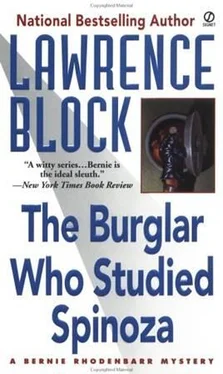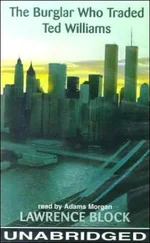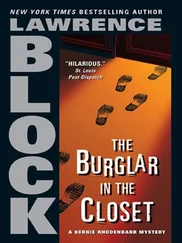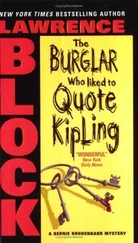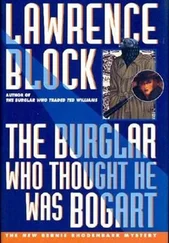"Company?"
"Yes," I said, and then it struck me that I'd better stop this lying before my nose started to grow. "No," I said.
"I knew it was one or the other. But which?"
"I'm alone," I said, "but evidently can't think straight. Are you at home?"
"No, I'm bopping around the bars. Why?"
"Going back to your place later?"
"Unless I get lucky, which it doesn't look like I'm gonna. Why?"
"You'll be home in the morning? Or will you be at the Poodle Factory?"
"I don't work Saturdays anymore, Bernie. I don't have to, not since I started doing a little burglary to make ends meet. Remember?"
"Maybe you could go over to the store when you wake up," I said, "and pick up your telephone answering machine, and take it back to your apartment."
"Why would I want to do that?"
"I'll be over around ten or so and tell you all about it."
"Jesus, I certainly hope so."
I hung up and it rang again and it was Denise, home at last and returning my call. I asked her how she would like company around one-thirty.
"It's almost that now," she said.
"I mean tomorrow afternoon. All right if I drop in for a few minutes?"
"Sure. Just for a few minutes?"
"Maybe an hour at the outside."
"Sure, I guess. Does this mark a new development in our ever-evolving relationship, Bernie? Are you advance-booking a quickie or something?"
"No," I said. "I'll be over around one-thirty, maybe a quarter of two, and I'll explain everything."
"I can hardly wait."
I hung up and got undressed. When I took my socks off I sat for a moment on the edge of my bed and examined my feet. I had never really studied them before, and it had certainly never occurred to me that they were narrow. They definitely looked narrow now, long and skinny and foolish. And there was no question about it, my second toes extended beyond my big toes. I tried to retract the offending second toes, tried to extend the big toes, but this didn't work, and I must have been damned tired to think it might.
Morton's Foot. I had it, all right, and while it wasn't as dismaying as a positive Wassermann, I can't say I felt happy about it.
So the phone rang.
I picked it up. A woman with an English accent said, "I beg your pardon?"
"Huh?"
"Is this Bernard Rhodenbarr?"
"Yes."
"I thought I might have dialed the weather report by mistake. You said 'It never rains but it pours.'"
"I didn't realize I'd said that aloud."
"You did, actually, and it is raining, and-I'm sorry to be calling you so late. I couldn't reach you earlier. My name is Jessica Garland. I don't know if that means anything to you."
"Not offhand, but I don't think my mind's at its sharpest. Not if I'm capable of answering the phone with a code phrase from a spy movie."
"You know, it did rather sound like that. I thought my grandfather might have mentioned me, Mr. Rhodenbarr."
"Your grandfather?"
"Abel Crowe."
My jaw may have hung loose for a moment. Then I said, "I never knew Abel had a grandchild. I never even knew he'd been married."
"I don't know that he was. He was certainly never married to my grandmother. She was from Budapest originally, and the two of them were lovers in Vienna before the war. When the Nazis annexed Austria in '38 she got out with my mother in her arms and the clothes she was wearing and nothing else. Grandfather's parting gift to her was a small fortune in rare stamps which she concealed in the lining of her coat. She went from Vienna to Antwerp, where she sold the stamps, and from there to London, where she died in the Blitz. Grandfather wound up in a concentration camp and survived."
"And your mother-?"
"Mother was five or six years old when Grandmother was killed. She was taken in by a neighbor family and grew up as an English girl. She married young, had me early on, and assumed her own father was dead, that he'd died in a concentration camp or in the war. It must have been about six years ago that she learned otherwise. I say, I'm doing a great lot of talking, aren't I? Do you mind terribly?"
"I find it rather soothing."
"Do you? Well, Grandfather literally turned up on our doorstep in Croydon. It seems he'd hired agents and finally succeeded in tracing Mother. There was a joyful reunion, but before very long they found themselves with precious little to say to each other. She'd grown up to be a rather ordinary English suburban housewife, while Grandfather-well, you know the sort of life he led."
"Yes."
"He returned to the States. He wrote letters, but they were more to me and my brother than to Mum. I've a younger brother, you see. Two years ago Grandfather wrote suggesting I might care to try living in America, and the suggestion came at just the right time. I quit my hateful job, said goodbye to my dreary young man, and boarded one of Freddie Laker's DC-10s. And to make a long story short-do you know, when people say 'To make a long story short,' it's already too late. In any event, I've been here ever since."
"In New York?"
"In Brooklyn, actually. Do you know Cobble Hill?"
"Sort of."
"I lived at first in a women's residential hotel in Gramercy Park. Then I moved here. The job at which I work is not hateful, and the young man with whom I live is not at all dreary, and I'm hardly ever homesick, actually. I'm rambling all over the lot, aren't I? Chalk it up to exhaustion, physical and emotional. And there's a point to all this, actually."
"I felt sure there would be."
"How very trusting of you. The point is that Grandfather spoke of you, and not only as, oh, shall we say a business associate?"
"I guess we shall."
"But also as a friend, don't you see. And now he's dead, as of course you know, and I shall miss him, and I think it's quite horrid how he died and I hope they catch the person responsible, but in the meantime it rather falls to me to get everything in order. I don't know what he would have wanted in the line of funeral arrangements because he never talked about the possibility of his own death, unless he left a letter of some sort, and if so it hasn't come to light yet. And of course the police have the body at the morgue and I don't know when they're likely to release it. When they do I suspect I'll manage some sort of private funeral without any ceremony, but in the meantime I think it would be fitting to have some sort of memorial service, don't you?"
"I guess that would be nice."
"I've arranged something, actually. There'll be a service at the Church of the Redeemer on Henry Street between Congress and Amity Streets. That's here in Cobble Hill. Do you know where it is?"
"I'll be able to find it."
"It's the only church I could find that would allow a memorial service on a Sunday. We'll be meeting there that afternoon at two-thirty. The service won't be religious because Grandfather wasn't a religious man. He did have a spiritual side, however. I don't know if he ever showed that side to you."
"I know the sort of reading he did."
"Yes, all the great moral philosophers. I told them at the church that we'd conduct our own service. Clay, the chap I live with, is going to read something. He was quite fond of Grandfather. And I'll probably read something myself, and I thought you might be able to take part in the service, Mr. Rhodenbarr."
"Call me Bernie. Yes, I could probably find something to read. I'd like to do that."
"Or just say a few words, or both. As you choose." She hesitated. "There's another thing, actually. I saw Grandfather every few weeks and we were close in certain ways, but he didn't mention many of his…business friends. I know you were a friend of his, and I know of one or two others in that category, but perhaps you'll be able to think of some other persons who might properly come to the service."
Читать дальше
